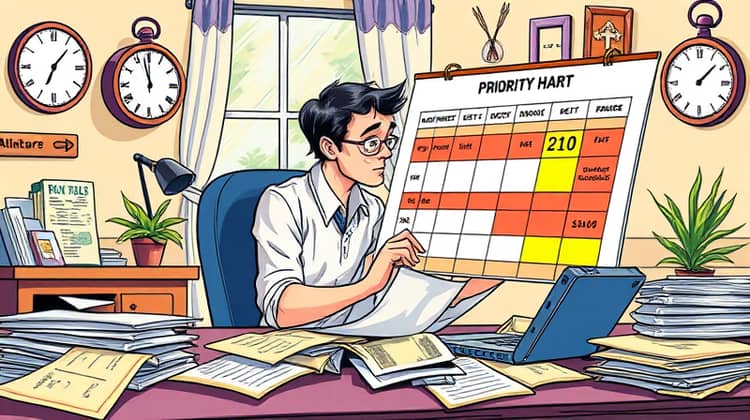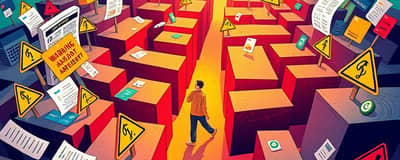Job Loss & Debt: 5 Steps to Take Control of Your Finances

Losing a job can be one of the most stressful experiences a person can face, especially when combined with the burden of debt. It’s essential to understand that this situation, while difficult, can be managed with a structured approach. Taking control of your finances now is crucial to moving forward and finding new opportunities.
In this article, we will outline five practical steps to help you regain control over your financial situation after job loss. Whether you need to create a budget or explore new income opportunities, these strategies can empower you to navigate this challenging time.
1. Assess Your Financial Situation

The first step in handling financial distress following a job loss is a thorough assessment of your current financial situation. Start by gathering all your financial documents, including bank statements, bills, and debt statements. Understanding your income, expenses, assets, and liabilities will provide a clearer picture of your overall financial health.
Next, evaluate your financial obligations and determine what expenses are essential versus discretionary. This will be critical in prioritizing where to cut back and managing your finances effectively during this uncertain time.
- List all sources of income, including unemployment benefits or savings.
- Identify monthly expenses such as housing, utilities, food, and transportation.
- Document outstanding debts along with their interest rates and minimum monthly payments.
Once you have a clear grasp of your financial situation, you can make more informed decisions about how to move forward. This assessment is the foundation for the next steps in taking control of your finances.
2. Create a Budget

Creating a budget is a key step toward managing your finances effectively after losing your job. By outlining your income and expenses, you can identify areas where you can save money and adjust your spending habits. A well-structured budget will help you stay on track during this challenging period.
Start by listing all your expected income sources, even if they’re temporary, then subtract your essential expenses to see how much you have left for discretionary spending.
- Calculate your total monthly income, including any unemployment benefits.
- Identify and categorize all necessary expenses, separating them from non-essential expenses.
- Create a realistic spending plan that prioritizes essential needs while minimizing discretionary spending. Use this budget to track your progress and make adjustments when necessary.
By creating and adhering to a budget, you can control your financial circumstances even when your income is unstable. It helps prevent overspending and allows you to allocate your resources effectively during this transitional time.
3. Prioritize Your Debts

When facing job loss and debt, it's crucial to prioritize which debts to focus on first. Not all debts are created equal, and understanding the implications of different types is essential for effective financial management.
- Focus on high-interest debts first, as they can grow quickly if left unpaid.
- Ensure that essential bills, such as housing and utilities, are paid to maintain your living situation.
- Consider negotiating lower payments with creditors.
By prioritizing your debts, you can avoid falling into deeper financial trouble and reduce your overall burden. Knowing which debts to tackle first can provide a clear pathway to regaining control of your finances.
4. Explore Income Opportunities

During periods of unemployment, it’s vital to explore new income opportunities to supplement your finances. This may require thinking creatively about your skills and resources. There are various avenues to consider that may help alleviate your financial stress.
Consider tapping into freelance work, part-time jobs, or gig opportunities that align with your skill set. The digital space offers numerous possibilities for earning from home, enabling you to generate income even while searching for a full-time position.
- Look for freelance or consulting opportunities in your area of expertise.
- Explore online platforms that connect individuals with temporary or gig work.
- Consider selling unused items around your home for quick cash.
By actively seeking new income sources, you not only ease financial pressure but also keep your skills sharp and your professional network engaged. This proactive approach can lead to new job opportunities down the line.
5. Seek Professional Help

If you're feeling overwhelmed by your financial situation, seeking professional help can provide guidance and support. Financial advisors or credit counselors can help you devise a plan tailored to your circumstances, offering expert insights into managing your debts and navigating your budget.
Many organizations offer free or low-cost services to help individuals in financial distress. Don’t hesitate to reach out for help, as gaining a professional perspective can clarify your options and assist in making informed decisions.
- Research local financial counseling services that specialize in debt management.
- Schedule initial consultations to discuss your financial situation and get advice.
- Follow up with a financial planner or coach to keep you accountable for your spending and financial goals.
Professional guidance can help alleviate some of the stress that comes with financial uncertainty. It can provide the structure and knowledge you need to take effective steps towards achieving your financial goals in this challenging time.
Stay Positive and Proactive

While job loss and debt can create a heavy burden, it’s essential to remain positive and proactive. Maintaining a mindset that focuses on possibilities and solutions can help you navigate this difficult period more effectively.
Building resilience during tough financial times is just as important as managing your budget. Keep in mind that many people experience job loss at some point, and recovery is possible with the right strategies in place.






